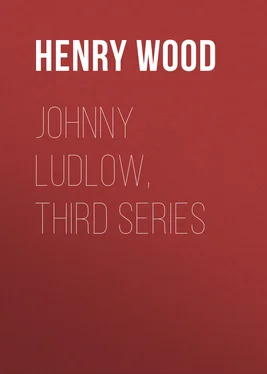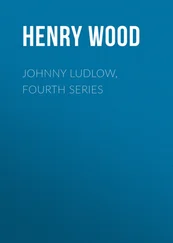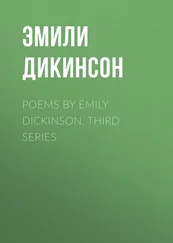Henry Wood - Johnny Ludlow, Third Series
Здесь есть возможность читать онлайн «Henry Wood - Johnny Ludlow, Third Series» — ознакомительный отрывок электронной книги совершенно бесплатно, а после прочтения отрывка купить полную версию. В некоторых случаях можно слушать аудио, скачать через торрент в формате fb2 и присутствует краткое содержание. Жанр: foreign_prose, literature_19, foreign_antique, на английском языке. Описание произведения, (предисловие) а так же отзывы посетителей доступны на портале библиотеки ЛибКат.
- Название:Johnny Ludlow, Third Series
- Автор:
- Жанр:
- Год:неизвестен
- ISBN:нет данных
- Рейтинг книги:4 / 5. Голосов: 1
-
Избранное:Добавить в избранное
- Отзывы:
-
Ваша оценка:
- 80
- 1
- 2
- 3
- 4
- 5
Johnny Ludlow, Third Series: краткое содержание, описание и аннотация
Предлагаем к чтению аннотацию, описание, краткое содержание или предисловие (зависит от того, что написал сам автор книги «Johnny Ludlow, Third Series»). Если вы не нашли необходимую информацию о книге — напишите в комментариях, мы постараемся отыскать её.
Johnny Ludlow, Third Series — читать онлайн ознакомительный отрывок
Ниже представлен текст книги, разбитый по страницам. Система сохранения места последней прочитанной страницы, позволяет с удобством читать онлайн бесплатно книгу «Johnny Ludlow, Third Series», без необходимости каждый раз заново искать на чём Вы остановились. Поставьте закладку, и сможете в любой момент перейти на страницу, на которой закончили чтение.
Интервал:
Закладка:
The Squire thought nothing: he said Hugh must have got into Coney’s house or some other neighbour’s house: and sat down to dinner, wondering why so much to-do was made. Mrs. Todhetley looked scared to death; and Tod tore about as if he were wild. The servants were sent here, the outdoor men there: it was like a second edition of that day in Warwickshire when we lost Lena: like it, only worse, more commotion. Hannah boldly said to her mistress that the strange man must have carried off the boy.
Hour after hour the search continued. With no result. Night came on, with a bright moon to light it up. But it did not light up Hugh.
Mrs. Todhetley, a dark shawl over her head, and I dare say a darker fear upon her heart, went out for the second or third time towards the Ravine. I ran after her. We had nearly reached the stile at the zigzag, when Tod came bounding over it.
“Has not the time for shielding this man gone by, think you?” he asked, placing himself in Mrs. Todhetley’s path, and speaking as coolly as he was able for the agitation that shook him. And why Tod, with his known carelessness, should be so moved, I could not fathom.
“Joseph, I do not suppose or think the man knows anything of Hugh; I have my reasons for it,” she answered, bearing on for the stile, and leaning over it to look down into the dark Ravine.
“Will you give me permission to inquire that of himself?”
“You will not find the man. He is gone.”
“Leave the finding him to me,” persisted Tod. “Will you withdraw the embargo you laid upon me?”
“No, no,” she whispered, “I cannot do it.”
The trees had an uncommonly damp feel in the night-air, and the place altogether looked as weird as could be. I was away then in the underwood; she looked down always into the Ravine and called Hugh’s name aloud. Nothing but an echo answered.
“It has appeared to me for several days that you have feared something of this,” Tod said, trying to get a full view of her face. “It might have been better for—for all of us—if you had allowed me at first to take the affair in hand.”
“Perhaps I ought; perhaps I ought,” she said, bursting into tears. “Heaven knows, though, that I acted from a good motive. It was not to screen myself that I’ve tried to keep the matter secret.”
“Oh!” The sarcasm of Tod’s short comment was like nothing I ever heard. “To screen me, perhaps?” said he.
“Well, yes—in a measure, Joseph,” she patiently answered. “I only wished to spare you vexation. Oh, Joseph! if—if Hugh cannot be found, and—and all has to come out—who he is and what he wants here—remember that I wished nothing but to spare others pain.”
Tod’s eyes were blazing with angry, haughty light. Spare him ! He thought she was miserably equivocating; he had some such idea as that she sought (in words) to make him a scape-goat for her relative’s sins. What he answered I hardly know; except that he civilly dared her to speak.
“Do not spare me : I particularly request you will not,” he scornfully retorted. “Yourself as much as you will, but not me.”
“I have done it for the best,” she pleaded. “Joseph, I have done it all for the best.”
“Where is this man to be found? I have been looking for him these several hours past, as I should think no man was ever looked for yet.”
“I have said that I think he is not to be found. I think he is gone.”
“Gone!” shouted Tod. “Gone!”
“I think he must be. I—I saw him just before dinner-time, here at this very stile; I gave him something that I had to give, and I think he left at once, to make the best of his way from the place.”
“And Hugh?” asked Tod savagely.
“I did not know then that Hugh was missing. Oh, Joseph, I can’t tell what to think. When I said to him one day that he ought not to talk nonsense to the children about corals and animals—in fact, should not speak to them at all—he answered that if I did not get him the money he wanted he’d take the boy off with him. I knew it was a jest; but I could not help thinking of it when the days went on and on, and I had no money to give him.”
“ Of course he has taken the boy,” said Tod, stamping his foot. And the words sent Mrs. Todhetley into a tremor.
“Joseph! Do you think so?”
“Heaven help you, Mrs. Todhetley, for a—a simple woman! We may never see Hugh again.”
He caught up the word he had been going to say—fool. Mrs. Todhetley clasped her hands together piteously, and the shawl slipped from her shoulders.
“I think, madam, you must tell what you can,” he resumed, scarcely knowing which to bring uppermost, his anxiety for Hugh or his lofty, scornful anger. “ Is the man a relative of yours?”
“No, not of mine. Oh, Joseph, please don’t be angry with me! Not of mine, but of yours.”
“Of mine!” cried proud Tod. “Thank you, Mrs. Todhetley.”
“His name is Arne,” she whispered.
“What!” shouted Tod.
“Joseph, indeed it is. Alfred Arne.”
Had Tod been shot by a cannon-ball, he could hardly have been more completely struck into himself; doubled up, so to say. His mother had been an Arne; and he well remembered to have heard of an ill-doing mauvais sujet of a half-brother of hers, called Alfred, who brought nothing but trouble and disgrace on all connected with him. There ensued a silence, interrupted only by Mrs. Todhetley’s tears. Tod was looking white in the moonlight.
“So it seems it is my affair!” he suddenly said; but though he drew up his head, all his fierce spirit seemed to have gone out of him. “You can have no objection to speak fully now.”
And Mrs. Todhetley, partly because of her unresisting nature, partly in her fear for Hugh, obeyed him.
“I had seen Mr. Arne once before,” she began. “It was the year that I first went home to Dyke Manor. He made his appearance there, not openly, but just as he has made it here now. His object was to get money from the Squire to go abroad with. And at length he did get it. But it put your father very much out; made him ill, in fact; and I believe he took a sort of vow, in his haste and vexation, to give Alfred Arne into custody if he ever came within reach of him again. I think—I fear—he always has something or other hanging over his head worse than debt; and for that reason can never show himself by daylight without danger.”
“Go on,” said Tod, quite calmly.
“One morning recently I suddenly met him. He stepped right into my path, here at this same spot, as I was about to descend the Ravine, and asked if I knew him again. I was afraid I did. I was afraid he had come on the same errand as before: and oh, Joseph, how thankful I felt that you and your father were away! He told me a long and pitiful tale, and I thought I ought to try and help him to the money he needed. He was impatient for it, and the same evening, supposing no one was at home but myself, he came to the dining-room window, wishing to ask if I had already procured the money. Johnny heard him knock.”
“It might have been better that we had been here,” repeated Tod. “Better that we should have dealt with him than you.”
“Your father was so thankful that you were at school before, Joseph; so thankful! He said he would not have you know anything about Alfred Arne for the world. And so—I tried to keep it this time from both you and him, and, but for this fear about Hugh, I should have done it.”
Tod did not answer. He looked at her keenly in the twilight of the summer’s night, apparently waiting for more. She continued her explanation; not enlarging upon things, suffering, rather, inferences to be drawn. The following was its substance:—
Alfred Arne asked for fifty pounds. He had returned to England only a few months before, had got into some fresh danger, and had to leave it again, and to hide himself until he did so. The fifty pounds—to get him off, he said, and start him afresh in the colonies—he demanded not as a gift, but a matter of right: the Todhetleys, being his near relatives, must help him. Mrs. Todhetley knew but of one person she could borrow it from privately—Mrs. Coney—and she had gone from home just as she was about to be asked for it. Only this afternoon had Mrs. Todhetley received the money from her and paid it to Alfred Arne.
Читать дальшеИнтервал:
Закладка:
Похожие книги на «Johnny Ludlow, Third Series»
Представляем Вашему вниманию похожие книги на «Johnny Ludlow, Third Series» списком для выбора. Мы отобрали схожую по названию и смыслу литературу в надежде предоставить читателям больше вариантов отыскать новые, интересные, ещё непрочитанные произведения.
Обсуждение, отзывы о книге «Johnny Ludlow, Third Series» и просто собственные мнения читателей. Оставьте ваши комментарии, напишите, что Вы думаете о произведении, его смысле или главных героях. Укажите что конкретно понравилось, а что нет, и почему Вы так считаете.












